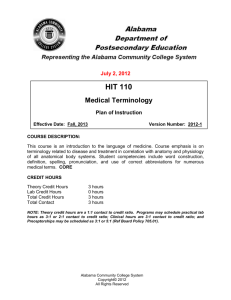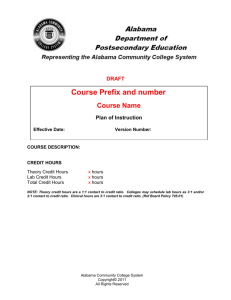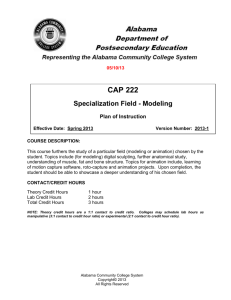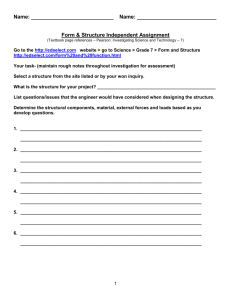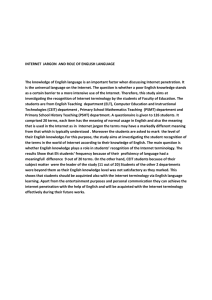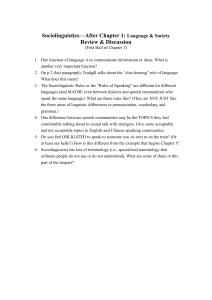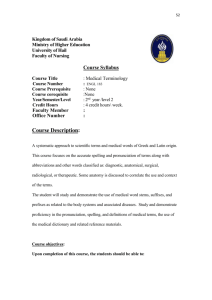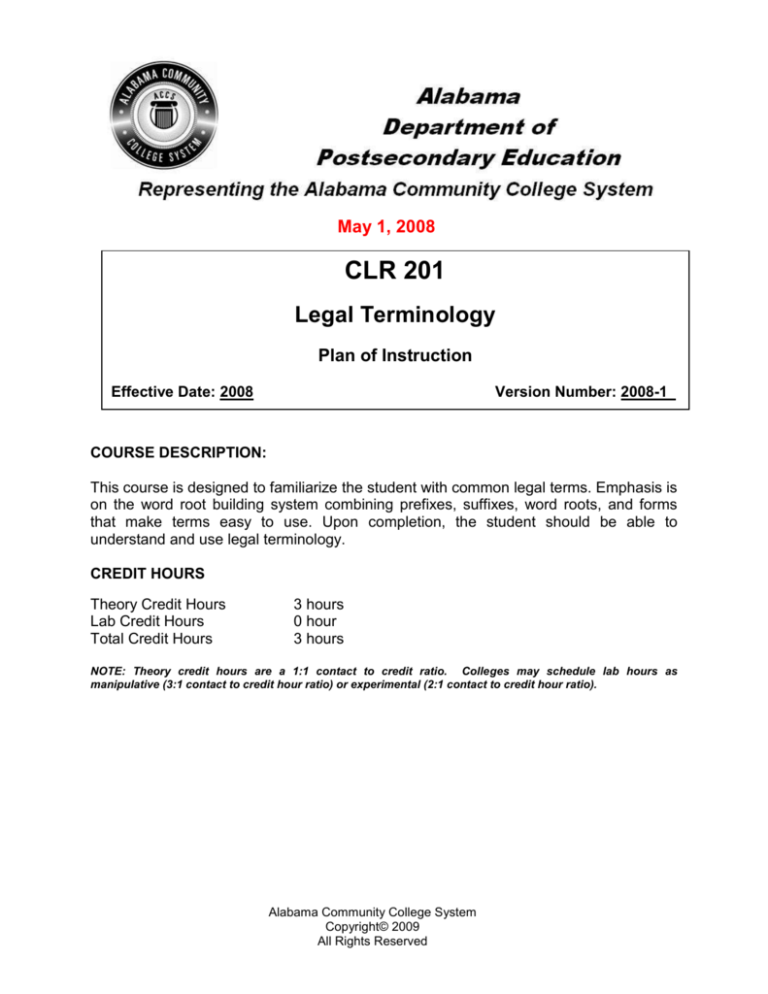
May 1, 2008
CLR 201
Legal Terminology
Plan of Instruction
Effective Date: 2008
Version Number: 2008-1
COURSE DESCRIPTION:
This course is designed to familiarize the student with common legal terms. Emphasis is
on the word root building system combining prefixes, suffixes, word roots, and forms
that make terms easy to use. Upon completion, the student should be able to
understand and use legal terminology.
CREDIT HOURS
Theory Credit Hours
Lab Credit Hours
Total Credit Hours
3 hours
0 hour
3 hours
NOTE: Theory credit hours are a 1:1 contact to credit ratio. Colleges may schedule lab hours as
manipulative (3:1 contact to credit hour ratio) or experimental (2:1 contact to credit hour ratio).
Alabama Community College System
Copyright© 2009
All Rights Reserved
Legal Terminology
CLR 201
PREREQUISITE COURSES
As determined by college.
CO-REQUISITE COURSES
As determined by college.
INSTRUCTIONAL NOTE:
This course is designed to provide students with an understanding of the legal
profession. Emphasis is placed on legal words, definitions, synonyms, pronunciations,
and usage, as well legal ethics and how to use legal reference tools.
PROFESSIONAL COMPETENCIES
Use legal words and terminology appropriately.
Use Latin phrases associated with the legal profession.
Comprehend the ethical issues associated with the legal profession.
Use the reference tools associated with the legal profession.
INSTRUCTIONAL GOALS
Cognitive – Comprehend principles and concepts related to legal terminology.
Psychomotor – Apply principles and concepts of legal terminology.
Affective – Value the importance of adhering to policy and procedures related to
legal terminology.
STUDENT OBJECTIVES
Condition Statement: Unless otherwise indicated, evaluation of student’s attainment
of objectives is based on knowledge gained from this course. Specifications may be in
the form of, but not limited to, cognitive skills diagnostic instruments, manufacturer’s
specifications, technical orders, regulations, national and state codes, certification
agencies, locally developed lab/clinical assignments, or any combination of
specifications.
ACCS Copyright© 2009
All Rights Reserved
2
Legal Terminology
CLR 201
STUDENT LEARNING OUTCOMES
MODULE A – LEGAL WORDS AND TERMINOLOGY
MODULE DESCRIPTION – The purpose of this module is to teach the students to use
legal words and terminology appropriately. Topics include areas of the law, government,
pronunciations, and synonyms.
PROFESSIONAL COMPETENCIES
A1.0
Use legal words and
terminology appropriately.
PERFORMANCE OBJECTIVES
A1.1
This competency is measured
cognitively.
LEARNING OBJECTIVES
A1.1.1
A1.1.2
A1.1.3
A1.1.4
Define legal words and terms associated with various areas of law.
Define words associated with the three branches of government.
Explain the correct pronunciation of various legal words and terms.
Describe the correct usage of various synonyms associated with legal
words.
MODULE A OUTLINE:
Areas of law
The three branches of government
Pronunciation
Synonyms
KSA
1
KSA
1
1
1
2
MODULE B – LATIN PHRASES ASSOCIATED WITH THE LEGAL PROFESSION
MODULE DESCRIPTION – The purpose of this module is to teach the students to use
Latin phrases associated with the legal profession. Topics include spelling, definitions,
and usage.
PROFESSIONAL COMPETENCIES
PERFORMANCE OBJECTIVES
KSA
B1.0 Use Latin phrases associated
B1.1 This competency is measured
1
with the legal profession.
cognitively.
LEARNING OBJECTIVES
KSA
B1.1.1 Identify the correct spelling of various Latin terms and phrases
associated with areas of the law.
B1.1.2 Define various Latin terms and phrases associated with areas of the law.
B1.1.3 Differentiate between correct and incorrect usage of various Latin
phrases associated with areas of law.
MODULE B OUTLINE:
Spelling
Definitions
Usage
1
ACCS Copyright© 2009
All Rights Reserved
3
1
3
Legal Terminology
CLR 201
MODULE C – LEGAL ETHICS
MODULE DESCRIPTION – The purpose of this module is to teach the students the
ethical issues associated with the legal profession. Topics include moral principles and
standards, the Code of Conduct, and adherence.
PROFESSIONAL COMPETENCIES
PERFORMANCE OBJECTIVES
KSA
C1.0 Comprehend the ethical issues C1.1 This competency is measured
2
associated with the legal
cognitively.
profession.
LEARNING OBJECTIVES
C1.1.1 Describe the moral principles and standards of behavior for people in the
legal profession.
C1.1.2 Explain the Code of Judicial Conduct.
C1.1.3 Differentiate between the appropriate and inappropriate adherence to the
Code of Judicial Conduct.
MODULE C OUTLINE:
Moral principles and standards
Code of Judicial Conduct
Adherence
KSA
2
2
3
MODULE D – LEGAL REFERENCE TOOLS
MODULE DESCRIPTION – The purpose of this module is to teach the students to use the
reference tools associated with the legal profession. Topics include Black’s Law
Dictionary, Legal Thesaurus, and the internet.
PROFESSIONAL COMPETENCIES
PERFORMANCE OBJECTIVES
KSA
D1.0 Use the reference tools
D1.1 This competency is measured
2
associated with the legal
cognitively.
profession.
LEARNING OBJECTIVES
D1.1.1 Describe the procedure for using the Black’s Law Dictionary.
D1.1.2 Describe the procedure for using a Legal Thesaurus.
D1.1.3 Describe the procedure for using the internet as a legal source.
KSA
2
2
2
MODULE D OUTLINE:
Black’s Law Dictionary
Legal Thesaurus
Internet
ACCS Copyright© 2009
All Rights Reserved
4
Legal Terminology
CLR 201
LEARNING OUTCOMES TABLE OF SPECIFICATIONS
The table below identifies the percentage of learning objectives for each module.
Instructors should develop sufficient numbers of test items at the appropriate
level of evaluation.
Limited
Knowledge and
Proficiency
Module A
Module B
Module C
Module D
ACCS Copyright© 2009
All Rights Reserved
1
75%
67%
Moderate
Knowledge
and
Proficiency
2
25%
67%
100%
Advanced
Knowledge
and
Proficiency
3
Superior
Knowledge
and
Proficiency
4
33%
33%
5
Legal Terminology
Indicator
1
2
3
4
CLR 201
Learner’s Knowledge, Skills and Abilities
Key Terms
Description
Identifies basic facts and terms about the subject or
competency.
Limited
Knowledge Performs simple tasks associated with the
and
competency. Needs to be told or shown how to do
Proficiency
most tasks.
Requires close supervision.
Identifies relationship of basic facts and states
general principles and can determine step-by-step
Moderate
procedures for doing the competency.
Knowledge
and
Performs most parts of the competency. Needs help
Proficiency
only on hardest parts.
Requires limited supervision.
Analyzes facts and principles and draws conclusions
about the subject to include why and when the
Advanced
competency must be done and why each step is
Knowledge
needed. Can predict outcomes.
and
Performs all parts of the competency. Needs only a
Proficiency
spot check of completed work.
Requires little or no direct supervision.
Can evaluate conditions and make appropriate
Superior
decisions as related to resolving problems.
Knowledge
Performs competency quickly and accurately with no
and
direct supervision and is able to instruct and
Proficiency
supervise others.
ACCS Copyright© 2009
All Rights Reserved
6

